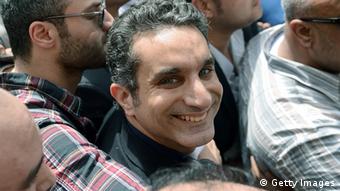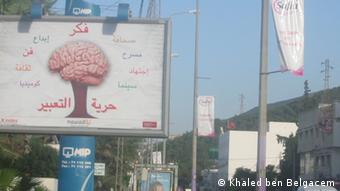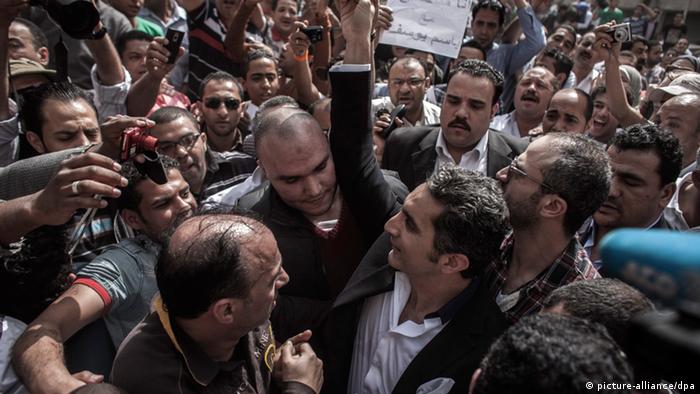More journalists, bloggers, musicians and other public figures are increasingly being summoned to court in an apparent crackdown on freedom of expression in Egypt and Tunisia. But they're not going without a fight.
Egyptian TV satirist Bassem Youssef, who has been compared with United States news parody show host Jon Stewart, this past week had to answer to Egyptian prosecutors over charges of insulting Islam and President Morsi. Although an Egyptian administrative court threw out a lawsuit filed by a Muslim Brotherhood lawyer seeking to ban Youssef and his satirical political show, Youssef still faces other, similar charges.
Meanwhile in Tunisia, rapper Weld El 15 was recently sentenced in absentia to two years in prison for insulting the police. The two cases point to ongoing efforts by Islamist forces to use the courts to muzzle criticism of North African governments.
The fall of dictatorial regimes after the Arab Spring apparently hasn't brought about any durable guarantees for freedom of expression. On the contrary, there seems to be an offensive against free speech in North Africa - yet this is being met with resistance, and the world is looking on.
'Judicial harassment'
Human rights groups note an increase in court cases charging religious defamation. Amnesty International researcher Diana Eltahawy cited an offensive targeting 33 activists, bloggers and politicians over the past few weeks. This represents increasing "judicial harassment" of those leveling political or societal critique, Eltahawy told DW.
This comes despite the new Egyptian constitution guaranteeing freedom of expression. Clauses about defamation opened a legal grey area that certain forces are trying to exploit to muzzle criticism, also in the form of satire.
Eltahawy pointed out that many of the legal challenges are filed by regular individuals or Islamist lawyers. Slander of political figures and denigration of religious values are the primary charges.
But the state prosecution has ultimate say in the matter, Eltahawy added. "They can make the decision not to press charges, not to refer the matters to court," she said. Though it should be defending free speech, instead "the public prosecutor is increasingly charging individuals for freely expressing themselves," Eltahawy said.
Creative expression targeted
Tunisian rapper Ala Yaakoubi, whose stage name is Weld El 15, was targeted for a video he produced calling the police dogs and accusing them of using excessive force. The rapper disappeared after a co-producer and dancer in the video were arrested this past March.
While a court handed down suspended sentences of six months each for the two who faced trial, on March 22 Weld El 15 was sentenced to two years in jail for insulting the police despite not being present at the trial. The case is widely seen as a threat to creative criticism against Tunisia's interim government, which is led by an Islamic coalition.
"I was only using the language of the police. They have harassed me verbally and physically. As an artist, the only way I could answer them is through art," Weld El 15 said in a Facebook video.
A Tunisian blogger who posted accusations of embezzlement against the former Tunisian foreign minister is also facing two years in prison. And graffiti sprayers from the street art group Zwewla (which means "poor ones" in Tunisian dialect) were arrested in November of last year for denouncing poverty in graffiti tags. Their apparent trespassing and "spreading false information with the aim of disrupting the public order" had them looking at five years in jail.
Wide-reaching defamation
Tunisia, as well, has laws that are supposed to guarantee freedom of the press and freedom of expression. After the fall of dictator Zine El Abidine Ben Ali in 2011, two governmental decrees were made protecting media.
But Maha Ouelhezi from the Tunisian bureau of the German pro-democracy Konrad Adenauer Foundation said that these decrees have been overrun by a flood of defamation lawsuits. "Journalists are suffering under an ongoing attack by politicians," Ouelhezi said of the situation. This has included violent attacks against media workers, she added.
Although such alleged defamation would at most be a civil offense, threatened drastic punishments criminalize such acts and have a silencing effect. Authorities are thus able to gag critics and direct the mass media.
In Youssef's case, the prosecution is investigating whether slander and degradation of values could have violated the license of the station that runs the satirical show - indicating the potential reach of such challenges.
Not without a fight
But attempts to gag freedom of expression are facing resistance. Eltahawy described a local outcry and demonstrations of support for those facing charges for their critical opinions. "People didn't take to the streets to ask for an end of repression and tolerance for dissent, to only be faced with this again now," she explained.
A support committee has been established for persecuted rapper Weld El 15, while the "Graffiti is not a crime" group on Facebook is drumming up support for Zwewla. And when Youssef and other prominent entertainers are brought in for questioning, their court appearances are accompanied by masses of supporters.
Meanwhile, media provide extensive coverage of the events. Such persecution has itself become a focus of attention, for example when Nobel Peace Prize winner Mohamed ElBaradei sharply critized the Youssef legal challenges. Via Twitter, the opposition leader declared such questioning as the kind seen in "fascist regimes."
International eyes are also turning on the region in concern over rights violations. Jon Stewart devoted a significant portion of a show last week to expression of solidarity with his Egyptian counterpart, and made a direct appeal to protect political satire. The US Department of State also expressed concern over the issue.
Youssef, for his part, even parodied Morsi on his way to court recently, again wearing a ridiculously large version of the silly hat Morsi had on at an award ceremony in Pakistan - an act that formed the basis of the initial charge of Youssef undermining Egypt's leadership.
And Youssef was back on the air Friday, railing against the president and attorney general. Whether a court decision on Saturday tossing the lawsuit will set a precedent remains to be seen. dw de




No comments:
Post a Comment